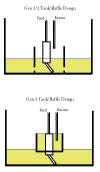
Home | Mailing List | Specifications | Care and Feeding | Modifications | Vendors | Literature

12/08/2007
I was up in Lake Forest, IL for work last night and was heading out to
my
car at ~7PM to head home. Hit the remote start button on my keyfob, and the
car turned over but did not fire up. After much inspection out in the
freezing cold and utterance of a few choice words that I'm not proud of, I
found out that the fuel pump wasn't priming. Fuse was fine, it was getting
power, just not running. Now, the gas tank was at about 1/4 according to
the gage (drove the car over 60 miles after it finally started, put in 13
gallons then), so I know it wasn't out of fuel. I ended up hitting the
remote starter and getting on my hands and knees with my snow scraper and
banging the underside of the gas tank to get the pump to run - engine fired
up.
All that to say, should I replace the fuel pump or could this just be a
freak issue with the cold and low fuel level? BTW ambient temps at the time
were about 15-20F and the car had not been run for about 7 hours.
Daniel J. Holtman
____________________________________________________________________________
There is an anti-backflow valve in the discharge of the fuel pump. The
extra cold could have caused the plastic to shrink a bit and bind the
valve, allowing your fuel rail to drain back. Several folks have
similar trouble with older Fords.
What they do is get in the car turn the key to "on" and let the fuel
pump cycle, then turn off and back on again a time or two more to get
pressure up in the fuel rail. Then they crank it for real and it will
start right away.
I have a good used stock fuel pump out of SHO R.T.S . that you can have
if you want it.
Eric Lehmann
_____________________________________________________________________________
Was it parked on an incline?
In years past, we frequently had emails about SHO's not starting on an incline
with a 1/4 tank of fuel or less.
I happened to me once (about four years ago?). I let it roll down a hill to
level ground and it fired right up.
I forgot whether teh SHO was pointed uphill or downhill.
Haven't heard anyone mention this on list in a long time, though.
Best Regards,
Doug
_____________________________________________________________________________
Probably late now but try not to routinely keep the tank low on fuel. This is a
return system with vapor lines I believe. On return systems with submerged pumps
the fuel is coolant for the fuel pump. Leave the pump uncovered by fuel and it
will burn out. Keep it half tank or about 90% of the time and it will probably
live forever unless it gets badly clogged for a long time and has to pump with a
big restriction.
Jim
_____________________________________________________________________________
Actually the fuel pump is in a small plastic reservoir that fills up holding
about a half gallon of fuel but never allows the pump to become exposed to air
for obvious reasons even if you run out of gas.
Carter Fuji
_____________________________________________________________________________
Hmm that is a better design. If you have more gas does it move in and out of the
reservoir more freely?
Jim
_____________________________________________________________________________
I believe the fuel return line dumps into the reservoir, and then it overflows
back into the tank. That way there's always fuel moving through the reservoir.
Daniel Holtman
_____________________________________________________________________________
That IS a pretty good design... Anyone have pictures
or diagrams?
The fuel pumps in my motorcycles have all been of a
similar "liquid cooled" design, and have burnout
issues, which you can imagine makes for interesting
value judgments WRT getting 150 miles/tank and
replacing fuel pumps or having to fill up every 120
miles. If there's a way to keep the pump submerged
more reliably, it would be great.
John Breen III
_____________________________________________________________________________
Wires going into the tank chaffed?
k mier
_____________________________________________________________________________
can get pictures of it when I get home as I have my stock one still on a shelf
but I don't recall if the pump is still in the assembly. The Dodge is also of
the same design but they don't sell the pump separate. I concluded it was done
this way since a submerged pump would not only stay somewhat cooled but since
there it would not be exposed to air it could not ignite the fuel in the tank.
Carter Fuji
_____________________________________________________________________________
I've never been inside a Gen3 tank, but I've seen plenty of Gen1/2 SHO tanks,
and they just have a small short-walled, corralled section in the center of the
tank, which the pump/float/sender assembly hangs down into. The reservoir walls
in Gen1/2 tanks are made of the same steel as the rest of the tank and built
into the inside of the tank's bottom, not made of plastic, as Carter describes
below.
Of course, it isn't magic, so when you run out of fuel, the reservoir does
empty, at least to the point where the pump sock (and hence the pump) is no
longer submerged...
Is the Gen3 system different from this? The only way I could imagine the pump
staying submerged even when you run out of fuel is if the reservoir surrounds
the top portion of the pump only, and not the pickup sock... Could that be?
Regards,
Jon Heese
_____________________________________________________________________________
Gen 3 fuel pump canister is different than gen 1/2. The canister is plastic and
totally encases the fuel pump. This is the gen 3 setup:

Daniel Holtman
_____________________________________________________________________________
Cool, that's pretty close to what I was imagining... See attached for my MS
Paint rendition. :)
Regards,
Jon Heese

ęCopyright 2000 - 2007; all rights reserved by V8SHO